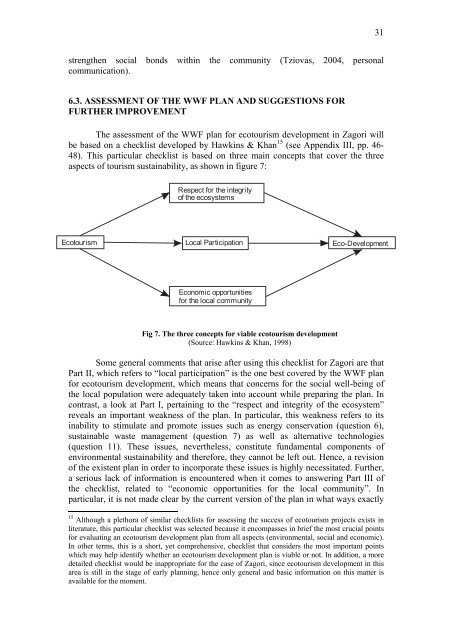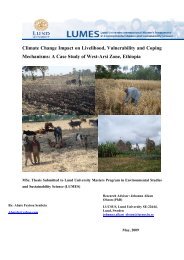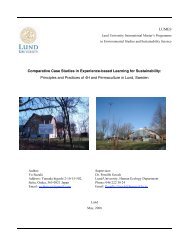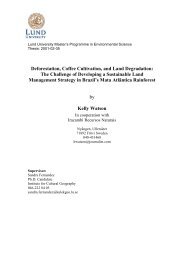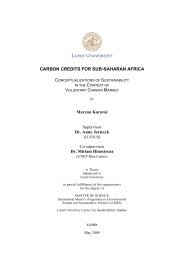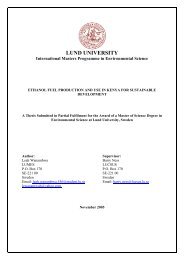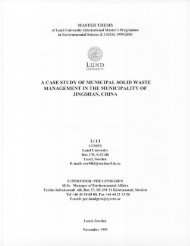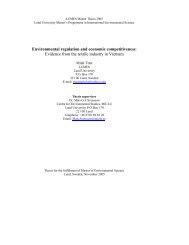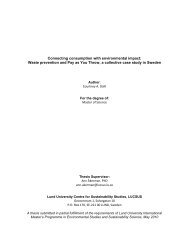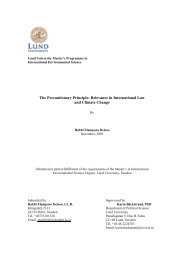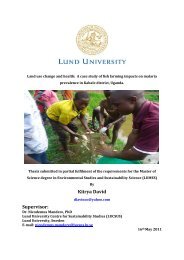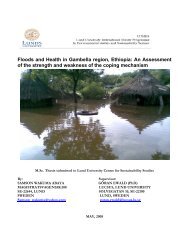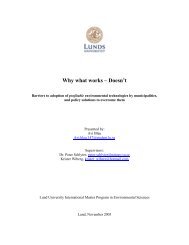31strengthen social bonds within the <strong>community</strong> (Tziovas, 2004, personalcommunication).6.3. ASSESSMENT OF THE WWF PLAN AND SUGGESTIONS FORFURTHER IMPROVEMENTThe assessment <strong>of</strong> the WWF plan for <strong>ecotourism</strong> <strong>development</strong> in Zagori willbe <strong>based</strong> on a checklist developed by Hawkins & Khan 15 (see Appendix III, pp. 46-48). This particular checklist is <strong>based</strong> on three main concepts that cover the threeaspects <strong>of</strong> tourism sustainability, as shown in figure 7:Respect for the integrity<strong>of</strong> the ecosystemsEcotourismLocal ParticipationEco-DevelopmentEconomic opportunitiesfor the local <strong>community</strong>Fig 7. The three concepts for viable <strong>ecotourism</strong> <strong>development</strong>(Source: Hawkins & Khan, 1998)Some general comments that arise after using this checklist for Zagori are thatPart II, which refers to “local participation” is the one best covered by the WWF planfor <strong>ecotourism</strong> <strong>development</strong>, which means that concerns for the social well-being <strong>of</strong>the local population were adequately taken into account while preparing the plan. Incontrast, a look at Part I, pertaining to the “respect and integrity <strong>of</strong> the ecosystem”reveals an important weakness <strong>of</strong> the plan. In particular, this weakness refers to itsinability to stimulate and promote issues such as energy conservation (question 6),sustainable waste management (question 7) as well as alternative technologies(question 11). These issues, nevertheless, constitute fundamental components <strong>of</strong>environmental sustainability and therefore, they cannot be left out. Hence, a revision<strong>of</strong> the existent plan in order to incorporate these issues is highly necessitated. Further,a serious lack <strong>of</strong> information is encountered when it comes to answering Part III <strong>of</strong>the checklist, related to “economic opportunities for the local <strong>community</strong>”. Inparticular, it is not made clear by the current version <strong>of</strong> the plan in what ways exactly15 Although a plethora <strong>of</strong> similar checklists for assessing the success <strong>of</strong> <strong>ecotourism</strong> projects exists inliterature, this particular checklist was selected because it encompasses in brief the most crucial pointsfor evaluating an <strong>ecotourism</strong> <strong>development</strong> plan from all aspects (environmental, social and economic).In other terms, this is a short, yet comprehensive, checklist that considers the most important pointswhich may help identify whether an <strong>ecotourism</strong> <strong>development</strong> plan is viable or not. In addition, a moredetailed checklist would be inappropriate for the case <strong>of</strong> Zagori, since <strong>ecotourism</strong> <strong>development</strong> in thisarea is still in the stage <strong>of</strong> early planning, hence only general and basic information on this matter isavailable for the moment.
32economic benefits will be generated for the local <strong>community</strong> (questions 1,2,3), neitherhow these benefits will be distributed among the local population (question 5). Thisimplies that the economic aspect <strong>of</strong> sustainability <strong>of</strong> the discussed plan might alsoneed to be revised in order to integrate more concrete and substantial proposals onimproving the economic well-being <strong>of</strong> the local <strong>community</strong>. More thoughts andproposals on how the WWF plan for <strong>ecotourism</strong> <strong>development</strong> in Zagori could beimproved in practice will follow.Zagori, as mentioned already earlier, is an area <strong>of</strong> great ecological and culturalvalue due to its distinct geomorphologic features, its high biological diversity and itsunique cultural elements. Notwithstanding, these exceptional characteristics <strong>of</strong> Zagoristill remain largely undiscovered by the average visitor who lacks special knowledge.Thus, the tourists’ perception <strong>of</strong> the natural and cultural beauty <strong>of</strong> the area is notrepresentative <strong>of</strong> its overall value. The local WWF <strong>of</strong>fice has the potential and theexpertise to help enhance the visitors’ understanding <strong>of</strong> the area, by improving therole <strong>of</strong> the already existing information center located in Papigo. Moreover, the deepknowledge <strong>of</strong> local residents concerning the natural environment and culturalelements <strong>of</strong> their area (such as local customs, traditions, myths etc.) should be utilizedfor improving the visitors’ understanding and appreciation <strong>of</strong> Zagori. For instance,local people could start leading guided tours for visitors both inside and outside thebuilt environment, in order to explain important points <strong>of</strong> the history, culture andnature <strong>of</strong> Zagori, which would otherwise remain undiscovered by most tourists.In addition, a kind <strong>of</strong> local certification could complement the idea <strong>of</strong>establishing the suggested “network <strong>of</strong> communities <strong>of</strong> Chamois biotopes”, bycreating a local logo/label depicting the Balkan Chamois. The adoption <strong>of</strong> this logo bythe aforementioned network would help identify the Balkan Chamois with thedestination <strong>of</strong> Zagori and, in the same time, differentiate Zagori from other mountaindestinations with similar pr<strong>of</strong>ile in Greece. There are two ways <strong>of</strong> utilizing this label.The first possibility would be to give it to Zagori as a whole, i.e. as a destination.Although in this case the requirements for calling this a certification scheme are notfulfilled, the advantage <strong>of</strong> this approach is that the adoption <strong>of</strong> the Balkan Chamois asthe <strong>of</strong>ficial logo <strong>of</strong> Zagori provides a special identity to all local products and tourismservices, which thus become recognizable by tourists and are identified with thedestination as a whole. The second possibility would be establishing a set <strong>of</strong> qualityand/or performance criteria and then awarding the label only to those tourismenterprises that reach or exceed the required standards. The advantage <strong>of</strong> thisapproach is that it is more beneficial for the natural environment, since it constitutesan incentive for tourism business to in Zagori to operate in a more sustainable way.This could also help visitors who are sensitive with regard to environmental issuesdistinguish and support those businesses in Zagori that operate in a moreenvironmentally friendly manner.Regardless <strong>of</strong> the approach that will be adopted, though, the establishment <strong>of</strong>the “network <strong>of</strong> communities <strong>of</strong> Chamois biotopes” and the adoption <strong>of</strong> the BalkanChamois as its <strong>of</strong>ficial label should also be linked to the conservation <strong>of</strong> the area’snatural resources. There are various ways <strong>of</strong> redirecting part <strong>of</strong> the revenues generatedby tourism to conservation purposes. For instance, a fixed symbolic amount could beadded to the bill <strong>of</strong> every hotel customer who visits Zagori (either through opt-in oropt-out procedures). The total amount accumulated from all tourism businesses inZagori within a year could be then spent on purposes such as scientific researchconducted by local universities/NGOs and/or environmental conservation projects inthe area. In any case, it is necessary to note that the creation <strong>of</strong> such a logo is not


